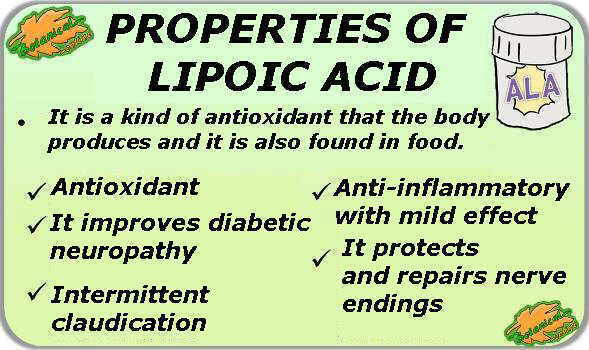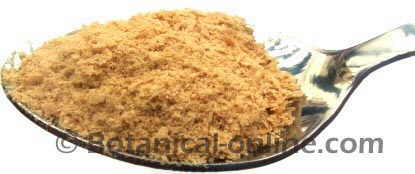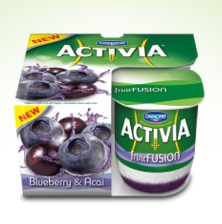Contents
- 1 Characteristics and benefits of lipoic acid
- 1.1 CHARACTERISTICS OF LIPOIC ACID
- 1.2 What is lipoic acid?
- 1.3 Characteristics of alpha-lipoic acid
- 1.4 Uses and functions of lipoic acid
- 1.5 Benefits of lipoic acid
- 1.6 Lipoic acid for metabolism and athletes
- 1.7 Medicinal properties of lipoic acid
- 1.8 Where can lipoic acid be found?
- 1.9 Types of lipoic acid supplements
- 1.10 Lipoic acid toxicity
- 1.11 Lipoic acid side effects
- 1.12 Contraindications of lipoic acid
Characteristics and benefits of lipoic acid
CHARACTERISTICS OF LIPOIC ACID
What is lipoic acid?
Alpha-lipoic acid, also known as thioctic acid or lipoic acid, is a coenzyme with strong antioxidant and detoxifying properties
For some time was considered a vitamin. But later it was discovered that this nutrient is made by the body itself, so it can not be considered as an authentic vitamin or essential nutrient.

A healthy diet provides all the nutrients for the body to synthesize its own lipoic acid.
Characteristics of alpha-lipoic acid
Alpha-lipoic acid is structurally similar to fatty acids and contains sulfur in minimal amounts (a very unimportant source, similar to the sulfur content of garlic or cruciferous).
The properties of this component in the metabolism, as a participant in the production of energy and as an antioxidant, have been increasingly praised in recent years.
It is said that the antioxidant properties of this component are much more powerful than those known as vitamin C or vitamin A. It has even been proven that lipoic acid is a component capable of renewing the antioxidants present in the body, prolonging its benefits.
Uses and functions of lipoic acid
The main properties of lipoic acid are:
- Antioxidant properties, with the capacity of neutralizing the negative effects of free radicals.
- Helping the vitamin B complex to produce energy from protein, fat and carbohydrates in food. It does so by acting as a coenzyme in metabolic reactions such as the Krebs cycle.
- It prolongs the life of antioxidants, with detoxifying properties of the organism and especially the liver.
- Helps improve liver health by its detoxifying role
- Diabetes, its possible role in the prevention of some complications of diabetes and high blood sugar is very interesting.
Benefits of lipoic acid
Lipoic acid is a substance that occurs naturally in the body, which is found in food, and can also be produced in laboratories for supplementation. In the latter case, it is advisable to buy supplements that contain a type of acid called alpha lipoic acid, which is the form that has greater absorption and benefits for the body.

Medicinal properties and possible benefits of supplements with alpha lipoic acid.
Lipoic acid for metabolism and athletes
Lipoic acid contributes to the metabolism of carbohydrates and fats, in obtaining energy from these substrates. Athletes can benefit from the role of this supplement for its antioxidant properties and its role in optimizing energy.
Medicinal properties of lipoic acid
Usually a varied diet is sufficient to meet the daily demands of this component. There are, however, situations in which it may be necessary to increase the daily dose through the use of food supplements of alpha lipoic acid.
Supplementation of this vitamin is useful in the following ailments:
- Diabetic Neuropathy: It has been shown that ingestion of lipoic acid supplements can be very useful in people with diabetes with an uncontrolled diabetic neuropathy with consequent damage to the nervous system cells. This supplement can slow the progression of the disease and helps to stabilize glucose levels in the blood by promoting the action of insulin. (Usual dose is 600 mg per day split into 3 doses)
- Multiple sclerosis: For its protective role of the nervous system, research is being done on the use of this supplement in the treatment of degenerative diseases of the nervous system such as multiple sclerosis.
- Reduces the symptoms of intermittent claudication: Scientific studies have observed that pain in the legs caused by poor circulation improves when taking these types of supplements.
- It helps to improve liver health: The use of lipoic acid improves the conditions of the diseased liver. It is used in diseases such as cirrhosis or hepatitis. You can prevent the negative effects of ingestion of toxic products that can lead to either disease or even liver cancer. (200 mg daily divided into 2 doses daily with 1000 mg vitamin C and 400 IU daily of vitamin E in the form of virgin wheat germ oil)
- It helps to improve Alzheimer: lipoic acid may be useful in preventing the development of Alzheimer’s or other forms of dementia senile, though no definitive evidence on this issue.
- Latest studies: the hypothesis that this supplement for its antioxidant properties, could be useful in the treatment of degenerative diseases such as cancer, cataracts or chronic fatigue syndrome is being studied. Although some animal experiments have yielded positive results, still must be very prudent in its use in people.
Where can lipoic acid be found?
The main thing is to know that there are natural sources of lipoic acid. The organism is capable of producing lipoic acid in its own organs. A healthy diet that provides all the nutrients will allow good levels of this nutrient / vitamin. This is the main reason because this principle is not considered as an authentic vitamin.

Brewer’s yeast.
- Animal sources of lipoic acid: The main animal source is beef liver, although it can be found in all meats and fish.
- Vegetable sources of lipoic acid: Among the main sources are green leafy vegetables, mainly spinach and cabbage, and whole grains. Brewer’s yeast is very rich.
- Lipoic acid supplements: In addition to food, this component can be purchased through supplements, in the form of capsules or tablets that are for sale in establishments of natural products.
Types of lipoic acid supplements
Chemically, alpha-lipoic acid (ALA) has a chiral central carbon and therefore has the S or R isomers. When a supplement is not specified, it means that it contains a racemic solution of both, while there are also supplements of R-ALA and those bound to sodium (Na-R-ALA). Some studies indicate greater availability of R-ALA, although it is also suggested that age is another determinant of bioavailability of this supplement, and that absorption is higher in women than in men. For all these reasons, differences between individuals must be considered and different responses expected.
Lipoic acid toxicity
There have been any reported cases of toxicity in the use of this supplement in doses up to 600 mg daily.
Lipoic acid side effects
Some people have shown intolerance reactions such as skin eruptions.
Contraindications of lipoic acid
- Lipoic acid should NOT be administered in pregnancy or lactation.
- Diabetics should undertake daily analysis to test if their sugar level drops too much.
- A doctor should be consulted about the convenience of using it if you are already under some medication.
![]() More information on lipoic acid.
More information on lipoic acid.








